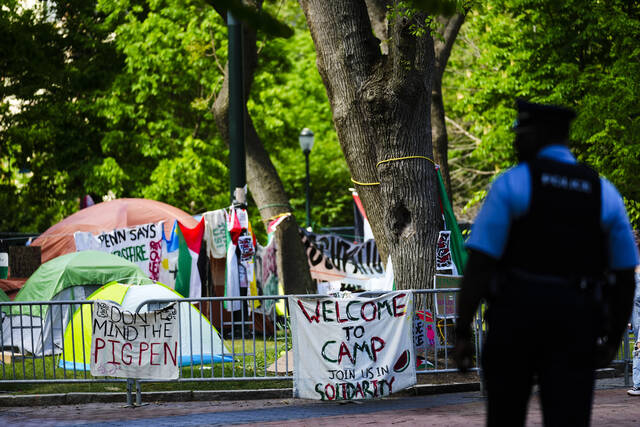https://naviga.triblive.com/opinion/jonathan-zimmerman-how-the-university-of-pennsylvania-lost-its-way-on-free-speech/
Jonathan Zimmerman: How the University of Pennsylvania lost its way on free speech

I teach at the University of Pennsylvania, which is an equal-opportunity censor. It suppresses voices on the right and the left, even as it proclaims its commitment to free and open dialogue.
That’s the sad takeaway of this month’s report by the Philadelphia-based Foundation for Individual Rights and Expression, which ranked Penn 248th out of 251 schools in its annual college free speech ranking. Conservative students are especially reluctant to speak their minds, the report found, lest they incur the wrath of liberal peers and faculty members. And after last spring’s campus protests against Israel, Penn established new speech restrictions that targeted demonstrators on the left.
Yes, you read that correctly. The right wing was afraid to speak, so we slapped constraints on the left wing as well. And that’s a bad deal for all of us.
Start with the sobering data from the same group on self-censorship, which showed that more than three-quarters of Penn students said they were “somewhat uncomfortable” or “very uncomfortable” publicly disagreeing with a professor. Nearly 60% said they were uncomfortable expressing a controversial political opinion during a discussion with fellow students outside of class.
The wariest students are conservatives, who are outnumbered on campus. But after the Israel-Hamas war began, critics of Israel — who are mostly on the left — expressed increasing fears as well. “When I am speaking about any pro-Palestinian sentiments, I must be careful with who I speak with as many are quick to hail them as ‘antisemitic,’” one Penn student in the FIRE survey wrote.
That’s unacceptable. We bring people to campus so they can learn from each other. And that won’t work if they’re biting their tongues.
Now Penn has made it worse, by promulgating a temporary set of guidelines on open expression that actually closes it off. The rules require students to reserve space for protests at least 48 hours in advance; for some heavily trafficked parts of campus, two weeks’ notice will be necessary.
There’s also a ban on using spray chalk and other “semi-permanent” substances on “any university surface.” Come on. College campuses were made for chalk protests, or so we used to think. What are we so afraid of?
We all know the answer. Last spring, protesters erected encampments — which are also prohibited under the new rules — and chanted phrases such as “From the river to the sea, Palestine should be free” and “Globalize the intifada.” Some people interpret those statements as demands for the elimination of Israel, or even of Jews. I’m Jewish, and I sometimes hear the chants the same way.
But that doesn’t mean we should ban them. The most troubling part of the new guidelines is their prohibition on protests that “threaten or advocate violence” against “individuals or groups” on the basis of their race, religion, national origin or sexual orientation.
That’s a near-echo of the 1988 speech code at the University of Michigan, which barred “any physical or verbal behavior” that stigmatizes or victimizes people based on a similar set of characteristics as the Penn guidelines. Over the 18 months that followed its adoption, before a federal court struck down the Michigan rule as unconstitutional, white students charged Black students with violating it in 20 instances. One Black student was disciplined for using the term “white trash.”
Get it? When you establish a speech rule to protect a group of people, it will be weaponized against them. And if you think otherwise, you just haven’t been listening.
All of this new rulemaking empowers university officials, of course, who get to define acceptable speech. And it demeans students, who should be making these calls on their own.
Of course, the university can and should prohibit direct threats of personal harm as well as sexual harassment, which are already barred under state and federal law. But all other speech should be free.
At Penn, alas, it isn’t. Whatever our political differences, we need to stand up for the right to express them. Anything less will diminish us all.
Copyright ©2026— Trib Total Media, LLC (TribLIVE.com)
